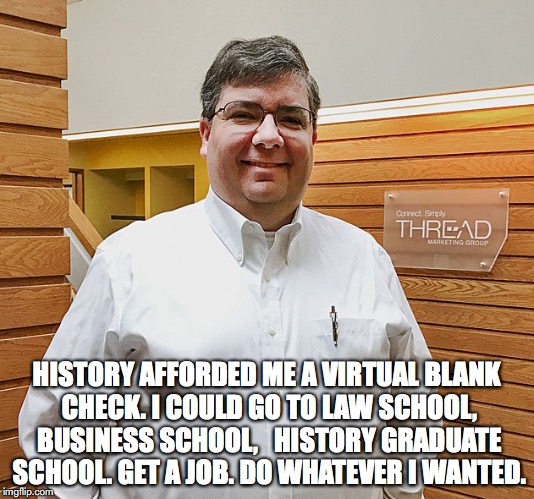Tags
Nathan Boyle, recently named the Director of Project Management at the Thread Marketing Group, has had a successful business career as a consultant in marketing and e-commerce. Despite this, his collegiate career didn’t start with a business degree; instead, he graduated BGSU with a degree in history. The path may seem odd, but not for Nathan, who credits his training in historical skills as a major boost for his career. Dr. Amílcar Challú and I interviewed Nathan about his views about the importance of college-level historical training in launching a career.
It did not take much prodding to get to Nathan’s opinion about why studying history matters: “[It] developed certain skills that set me apart from traditional business applicants” in my first job, he said. “Critical thinking skills are the most important characteristic a person can have in any field. Unfortunately, the skill is not taught in grade school and many college programs do not teach it either.” History programs, on the other hand, teach and develop critical thinkers, which set historians apart. From understanding historical significance, to interpreting the past from varied and potentially biased evidence, historians are expected to think critically about everything. Expanding on the advantages critical thinking and other historical skills such as analysis, organization and perspective provided him, Nathan states that his history degree allowed him to pursue any career he wanted post-university life. “History afforded me a virtual blank check. I could go to law school. Business school. Become a doctor. Go to history graduate school. Get a job. Do whatever I wanted.” History degrees do not all go on to become professors or get a PhD. Many go into business, become museum professionals, work for the government, go to law school, etc. Historians and their skills are universal across the world.

Nathan Boyle, BGSU History Alum, 1997
Can you give an advice to current history students? Education itself is the most important aspect of going to college, not having a set-in career path. “Educating yourself is the most important thing as it develops responsible societal citizens who can make a better world. You do not need a set career in place. I didn’t! No matter what you do, no one can take your education from you.” He urges students to take your time, enjoy the ride, and develop the skills necessary to succeed later in life. As Nathan so eloquently stated, “You can make your career later,” especially with a liberal arts degree in history. Asked for final comments related to the question of if he had any regrets studying history instead of business or other, more “practical” degrees, he laughed simply yet stated emphatically “none”.
Next time somebody asks you what you can do with a history degree, simply say “whatever I want.” Because, as Nathan Boyle pointed out and proves, you truly can go anywhere and do anything, especially when accompanied by universal skills honed by the historical process.
John Stawicki. John Stawicki is a recent History alum. He is currently pursuing a Masters degree in history as well as a CPA.
